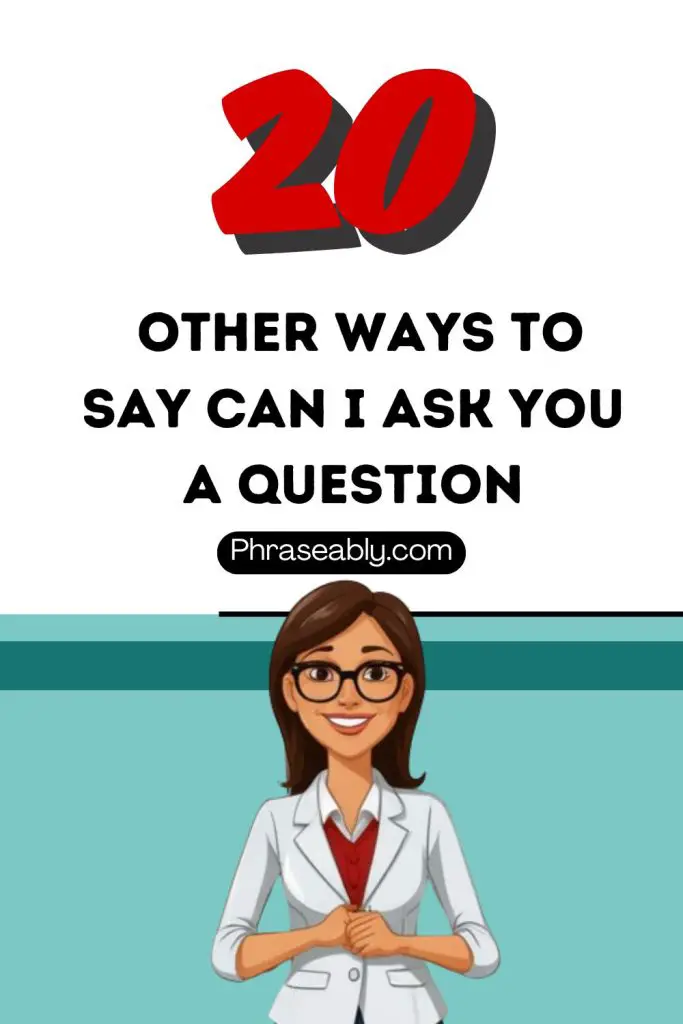Questions are designed to gain clarity on issues or topics that aren’t so comprehendible to us. Sometimes it could be used to make a request or permission to proceed with a task.
“Can I ask you a question” is an example of a question used to make a request and to gain clarity on a situation. It could be in a meeting, classroom, or seminar, that this question might be asked.
Instead of saying it the same old way, be different, make this request using other choices of words that this article entails so that you can begin to be unique and advance your English expressions.
Alternative Ways to Say “Can I Ask You a Question”
Below are other ways that you can choose to articulate that you would like to ask someone a question.
- May I ask you something?
- Do you mind if I ask you something?
- Can I run something by you?
- I have something to ask, is it cool?
- Could I inquire about something?
- Do you have a second to spare for a quick question?
- Would you mind if I asked you something?
- Could I pick your brain for a second?
- May I inquire about something?
- Can I get your opinion on something?
- Would you mind answering a question?
- May I ask for your input on something?
- Do you have a minute for a question?
- Can I ask for your advice?
- Is it okay if I ask you something?
- May I get your thoughts on something?
- Could you help me with a question?
- Can I seek your advice on something?
- Would you be open to a question?
- May I pose a question to you?
May I ask you something?
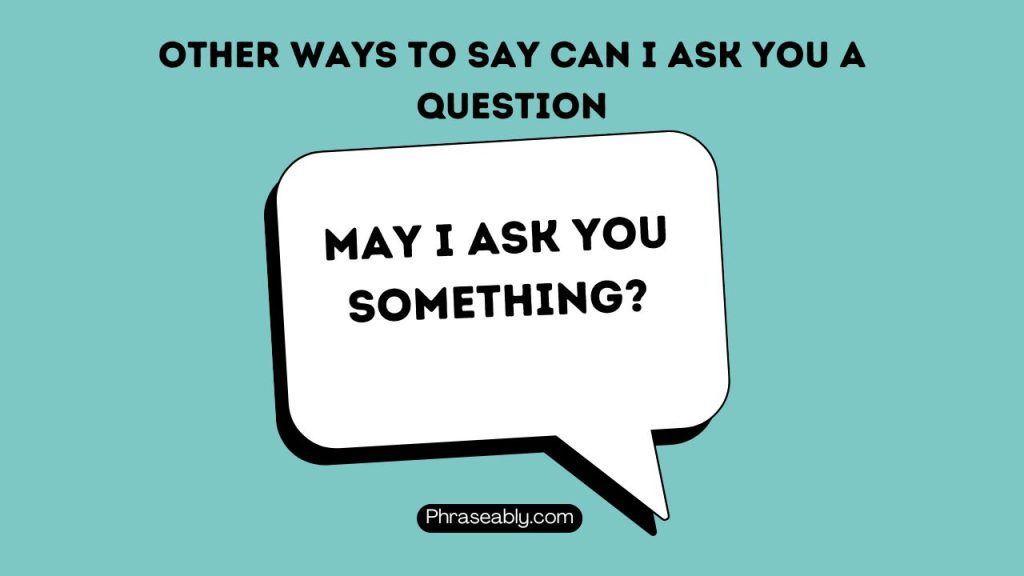
This is a suitable way to request a question from someone. Apart from the fact that it can be used in a formal setting, it also has an informal tone to it which will help out in making a person have their request granted in no time.
In a meeting with your subordinates or superiors, this question will come in handy to help you gain clarity on certain things.
Example:
- I love how well this project presentation is going thus far but may I ask you something if you won’t mind?
- I don’t want you to be annoyed with me and that’s why I have to say, may I ask you something?
Do you mind if I ask you something?
There’s always a better and easier way to say or do anything and one better and easier alternative to say ‘can I ask a question,’ is by articulating it in this manner.
Without any need to worry about sounding demanding or entitled, this will aid you in having the knowledge of how to enquire about things from people in a polite way.
Example:
- Do you mind if I ask you something? How does someone merge an infant company with a company that’s already thriving?
- Do you mind if I ask you something? I promise that I won’t waste much of your time sir.
Can I run something by you?
A question like this suggests that you have an idea or thought you want to share, usually seeking feedback or a quick response.
It implies the question or comment may require some consideration or confirmation from the person you are asking.
Example:
- Excuse me ma, I don’t know if you have the time but can I run something by you?
- There have been times that I have hesitated with my decision and that’s why I came to you, can I run something by you?
I have something to ask, is it cool?
This is a very casual yet formal way of asking for permission. It signals respect for the other person’s time and availability and softens the request by using “Would it be okay.”
If you are aware of a person’s busy lifestyle or hectic schedule and you would like to borrow a little of their time, you can request sensitively by saying it this way.
Example:
- I have something to ask, is it cool?? I promise that I will not take any more of your time, I only need a minute.
- Your theory about time traveling is quite fascinating. I have something to ask, is it cool?
Could I inquire about something?
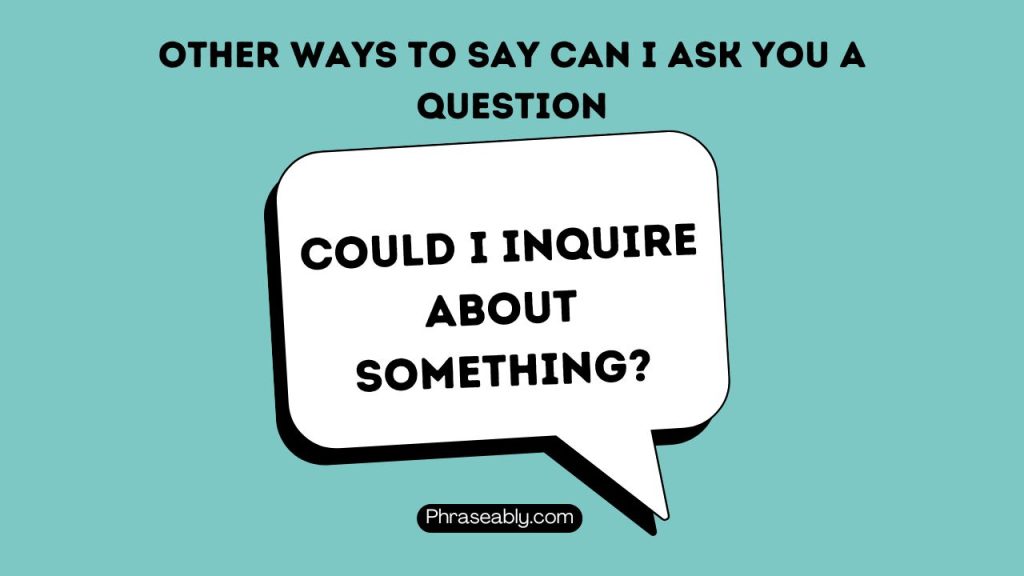
It might be used in professional or official contexts where the speaker, which is you, wants to be particularly respectful. Rather than asking predictably, you can ask with a phrase like this in a board meeting for instance.
Example:
- Could I inquire about something? I am not so sure about where I can register for the program, I need you to inform me about that.
- Could I inquire about something? It’s been a long time coming and I am grateful that I now have the opportunity to do so now.
Do you have a second to spare for a quick question?
With a question like this, you acknowledge the other person’s possible busy schedule and ensure you’re not taking up too much of their time.
It also means that your question is brief and to the point which could help in making the individual see reasons why they should respond to you or spare you their time.
Example:
- Hello ma, I don’t mean to startle you or anything like that, but I just wanted to know if you have a second to spare for a quick question.
- Do you have a second to spare for a quick question? I really have to understand the assignment given to us by the lecturer, please just a minute is enough.
Would you mind if I asked you something?
This polite phrase seeks permission to ask a question, but it also subtly acknowledges that the person may not be willing or available.
You sound courteous, emphasizing that their response matters if you make use of this phrase in any shape or form.
There are many ways that you can make use of this phrase in a full sentence and a few will be seen through the example provided.
Example:
- I have to admit that you pitched the presentation excellently. Would you mind if I asked you something?
Could I pick your brain for a second?
Let’s say you are in a more informal setting like a get-together with your friends, a dinner date, or whatever, you need this kind of phrase that can help you ask or make a request since it is informal and conversational.
What it translates to is that you’re seeking advice or insight, usually from someone with expertise or knowledge on a particular subject.
Example:
- I was watching a funny video about riddles online and that leads me to ask you this question, could I pick your brain for a second?
- Could I pick your brain for a second? I am super sure that you wouldn’t know the answer to this question.
May I inquire about something?
Just like the third phrase, this is formal and proper, and it emphasizes respect for the other person’s time and knowledge.
An expression like this is especially appropriate in academic or formal business settings. For instance, if you want to ask your lecturer a question, this would be a great alternative.
Example:
- I love languages and arts and that’s why I am always happy to be in your class. May I inquire about something?
Can I get your opinion on something?
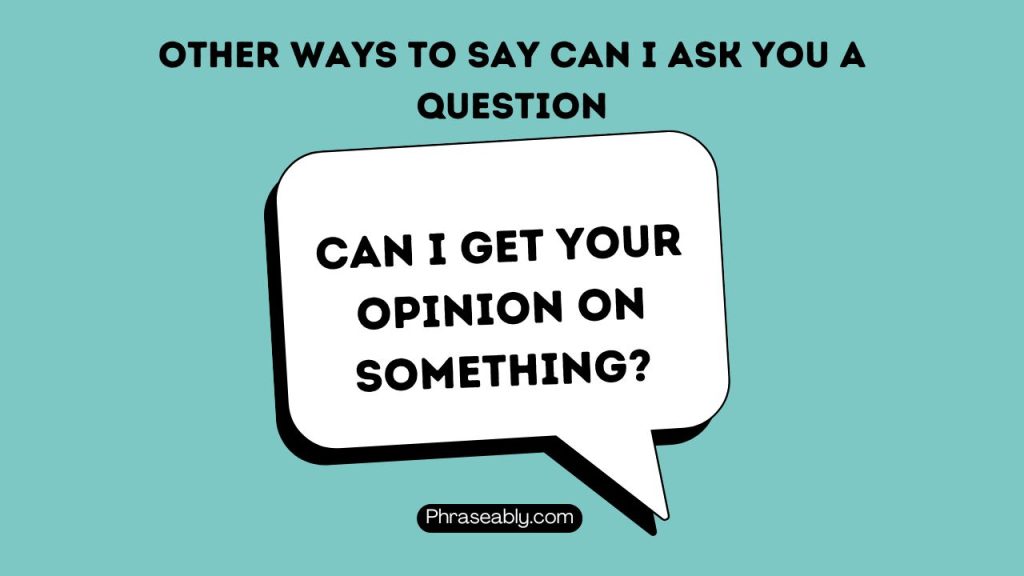
A more specific request is what this phrase is, which implies that your question is about seeking someone’s thoughts, ideas, or feedback on a matter, rather than just asking any kind of question.
With a question like this, you are inviting the other person to share their perspective or expertise.
Example:
- I know that you all believe in love and sacrifice but can I get your opinion on something?
- There has to be a person who does not agree with this ideology. Can I get your opinion on it?
Would you mind answering a question?
Learn to speak in a less predictable way by increasing the span of your vocabulary. This question is polite and indirect, softening the request by implying that it’s up to the listener to agree.
The phrase “Would you mind” suggests that you’re considerate of their time and feelings, emphasizing courtesy.
Example:
- I know that you are vast in Physics and I need to test that. Would you mind answering a question?
- Would you mind answering a question? It’s about what happened on the 16th of July, 2O22.
I need your opinion on something.
This question seeks more than just a simple answer; it implies that you’re asking for the person’s opinion or feedback on a specific issue. The use of “may I” is formal and respectful, adding an element of politeness.
Example:
- I think that Chelsea is about to make a big mistake. I need your opinion on something.
- What else would I be able to do right now, I need your opinion on something.
Can you spare some minutes for a question?
An expression like this is similar to asking for a person’s time, acknowledging that they might be busy. It suggests that your question is brief and you don’t want to impose too much on their time, making it considerate of their schedule.
Example:
- Can you spare some minutes for a question? This would not take long.
Can I ask for your advice?
This phrase specifically asks for guidance or recommendations, often on a personal or professional matter. It’s a direct request that implies respect for the other person’s knowledge or experience.
Example:
- Since you are a medical practitioner, can I ask for your advice on something?
- Can I ask for your advice on something bothering me?
Is it okay if I ask you something?
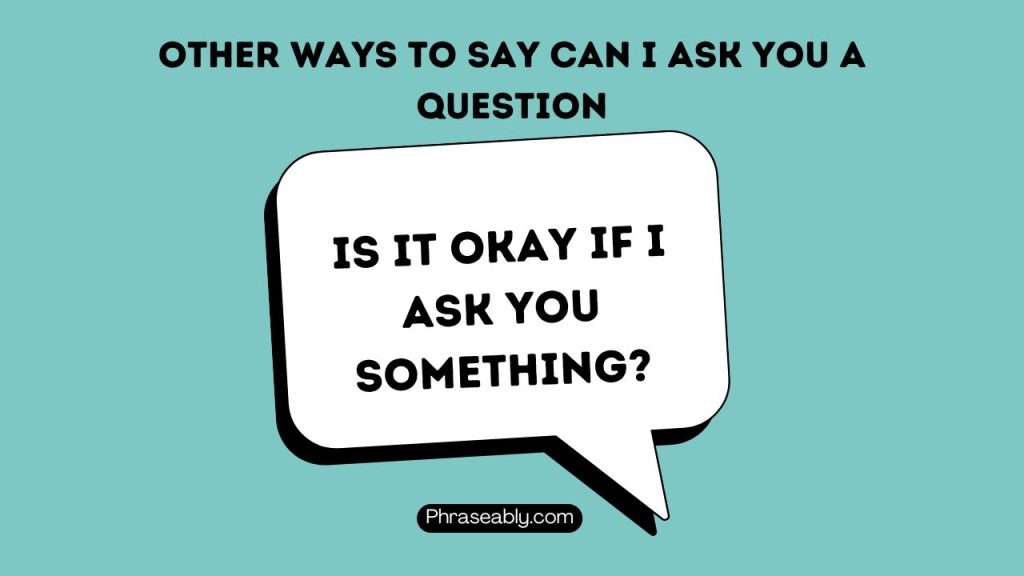
Choose a very casual and conversational way to seek permission to ask a question. By framing the request as a question itself, softens the approach and shows that you value the listener’s consent.
Example:
- I want to get your thoughts on something!
May I get your thoughts on something?
“May I get your thoughts on something?” indicates that you’re asking for an opinion or perspective, rather than just a straightforward answer.
“May I” makes it more formal, while “Get your thoughts” suggests you value their insight.
Example:
- May I get your thoughts on something? I don’t seem to understand.
- May I get your thoughts on something that you are conversant with?
Could you help me with a question?
You’re not only requesting an answer but also assistance with understanding or solving a problem. It means that you are looking for more than just an answer, but possibly a more in-depth discussion or explanation.
Example:
- Could you help me with a question? I need the right answer to be able to move on.
- Could you help me with a question that has been on my mind all day?
Can I seek your advice on something?
Asking for advice? This phrase is slightly more formal. The word “seek” adds a thoughtful tone, indicating that you value their guidance and are intentionally turning to them for help.
Example:
- My mind is so puzzled at the moment, can I seek your advice on something?
Would you be open to a question?
In this type of phrase what you’re implying is that you owe consideration for the person’s willingness to engage. It’s a more indirect way to ensure they’re comfortable with being asked a question.
Example:
- Would you be open to a question?
- Would you be open to any type of question?
May I pose a question to you?
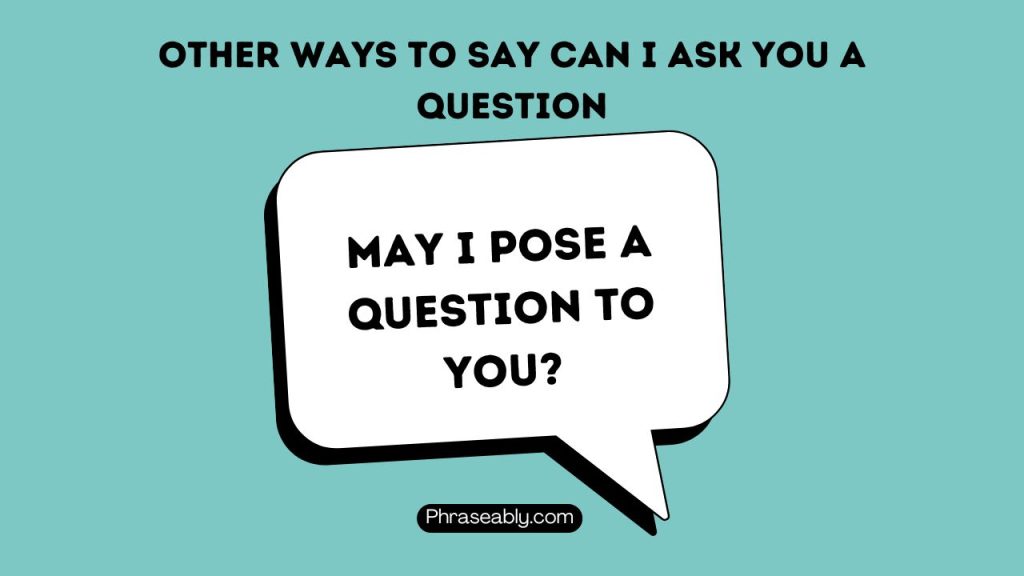
The word “pose” adds an element of respect, often used in professional or academic contexts, where formality is appreciated.
Example:
- May I pose a question to you quickly? What are your thoughts on global warming?
- We have seen that apes are evolving animals. May I pose a question to you?
